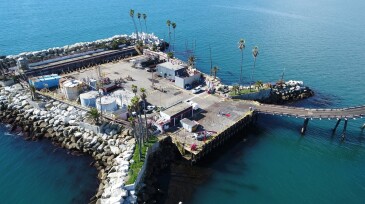Decommissioning
Despite a 2.8% drop in liquefied natural gas exports in 2025 because of lost market share in China, Australia anticipates a 2026 rebound as new North West Shelf capacity comes online. Meanwhile, East Coast operators brace for a tsunami of wells entering the decommissioning pipeline and potential energy shortfalls necessitating LNG imports.
The North Sea Transition Authority has published its first table identifying 13 operators that are behind schedule in decommissioning their inactive North Sea wells.
Estimates commissioned by the Australian government suggest that increasing efficiency will lower costs for decommissioning offshore Australia.
-
The Heerema semisubmersible crane vessels Thialf and Sleipnir were used on the job to remove the 36,000-ton structure.
-
The impact of orphan wells, both on the environment and on tightening budgets, is a growing concern in the industry. Boom times result in a vast uptick in wells drilled. In bust times, when companies disappear, the liability outlook for these probes gets murky and federal and state governments start looking for answers.
-
The paper explores the biology of the invasive Tubastraea sun coral, aiming to identify methods to eliminate or diminish its spread.
-
Expressions of interest released by the operator include everything from abandonment to life extension.
-
-
The paper reviews an operator’s deepwater field project offshore Mauritania, for which several techniques were considered with respect to decommissioning a subsea pipeline system at water depths of 700 to 960 m.
-
Phased work to remove Heimdal and Veslefrikk A from the Norwegian North Sea shelf should be completed sometime in 2025.
-
One of the last oil facilities in state waters on the path towards full decommissioning slated to begin in 2022.
-
The complete paper presents the results of an investigation into the creep behavior of North Sea shales and their ability to form effective annular barriers.
-
Final lab testing has been completed and field trials of the ultrahigh expansion bridge plug will begin by the end of this year.













